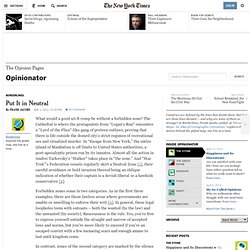

Sorry States - Dominique Moisi. Exit from comment view mode.

Click to hide this space PARIS – National repentance is in the news again, as it has been with remarkable frequency in recent years. In 2008, Australia’s then-Prime Minister Kevin Rudd apologized to his country’s Aborigines, while Queen Elizabeth II offered a moving gesture of contrition in Ireland a few months ago. And now, French President Nicolas Sarkozy, on a recent visit to the Caucasus, reiterated his advice to the Turks to “repent” for the massacres of Armenians committed by the decaying Ottoman regime in 1915. Of course, Sarkozy would be surprised to be told that the same logic should lead to a declaration of repentance by the French state to Algeria, not to mention to the Algerian soldiers who fought under the French banner, the so-called “Harkis,” many of whom were abandoned to a terrible fate when France left the country in a hurry.
For many political leaders and analysts, repentance is a misplaced and excessive form of sensitivity. National responsibility and historic crimes. Your country has probably done some very bad things.

Perhaps recently, perhaps before you or even your parents were born. How do you feel about that? Does your present government have a duty to make amends for the bad things it has done, for example with apologies and reparations? Intuitively most people think so, but what kind of duty is that and what does it require from you as a citizen or subject? And how can you get other countries to admit that they have done wrong? National identity presumes that a country, like a person, has an enduring individual identity over time. Personal identity is philosophically controversial - after all people do change significantly as they go through life in all sorts of ways. Collective responsibility is concerned with showing that a country's people are ultimately responsible for its actions and therefore guilty of its crimes. Put It in Neutral. Borderlines explores the global map, one line at a time.

What would a good sci-fi romp be without a forbidden zone? The Cathedral is where the protagonists from “Logan’s Run” encounter a “Lord of the Flies”-like gang of preteen outlaws, proving that there is life outside the domed city’s strict regimen of recreational sex and ritualized murder. In “Escape from New York,” the entire island of Manhattan is off limits to United States authorities, a post-apocalyptic prison run by its inmates.
We're Sorry: Not All Apologies Are Apologies - Miller-McCune. Politicians take note: Research shows the fine line between claiming regret and taking responsibility.

Variations on “I’m sorry” are playing an increasingly prominent part in our public and private discourse, with figures as diverse as Charlie Sheen and the CEO of BP making widely circulated statements of remorse. In an era of truth commissions, demands for redress of historical grievances, and humiliating revelations of personal indiscretions, apologizing has evolved into a nuanced ritual, one that has attracted the interest of researchers from a variety of disciplines. The Politics of Sorry - By Karl E. Meyer. Flattery Inflation. Charisma We Can Believe In - Joseph S. Nye. Exit from comment view mode.

Click to hide this space CAMBRIDGE – A leadership transition is scheduled in two major autocracies in 2012. Neither is likely to be a surprise. Xi Jinping is set to replace Hu Jintao as President in China, and, in Russia, Vladimir Putin has announced that he will reclaim the presidency from Dmitri Medvedev. Among the world’s democracies, political outcomes this year are less predictable. Why working-class people vote conservative. Why on Earth would a working-class person ever vote for a conservative candidate?

This question has obsessed the American left since Ronald Reagan first captured the votes of so many union members, farmers, urban Catholics and other relatively powerless people – the so-called "Reagan Democrats". The Power of Living in Truth - Jeffrey D. Sachs. Exit from comment view mode.

Click to hide this space NEW YORK – The world’s greatest shortage is not of oil, clean water, or food, but of moral leadership. With a commitment to truth – scientific, ethical, and personal – a society can overcome the many crises of poverty, disease, hunger, and instability that confront us. Yet power abhors truth, and battles it relentlessly. So let us pause to express gratitude to Václav Havel, who died this month, for enabling a generation to gain the chance to live in truth. Havel Lives - Karel Schwarzenberg, Desmond Tutu and Richard von Weizsäcker. Exit from comment view mode.

Click to hide this space PRAGUE – The death of Václav Havel, the former president of Czechoslovakia and the Czech Republic, has been marked with mourning around the world. For his friends, the loss is overwhelming, but we all take comfort from the fact that his courage and his ideas helped to change our world for the better, and are still continuing to do so. Throughout his life, Havel was an unconquerable fighter for freedom and human dignity. He was the leader of the Velvet Revolution, which brought communism to a peaceful end in his homeland, a dissident intellectual who, by his unswerving conscientiousness and disciplined, down-to-earth idealism, led his compatriots in their struggle to overcome the totalitarian mindset in the years after they regained their freedom. But Havel not only changed his society and Europe; he also set an example for all who struggle for freedom. The Truth about Negotiations - Alexios Arvanitis. Exit from comment view mode.

Click to hide this space ATHENS – When people and countries negotiate, they often talk about their interests as though they were the only matters that could elicit agreement. In casting his veto at the European Union’s December summit in Brussels, British Prime Minister David Cameron said, “What is on offer isn’t in Britain’s interests, so I didn’t agree to it,” as if agreement solely depended upon whether or not interests were satisfied.
Then again, reaching an agreement might never have been Cameron’s goal. "Don’t Blame it on Rio" by Michel Rocard. Exit from comment view mode.

Click to hide this space PARIS – We are little more than a decade into the twenty-first century, but a terrible precedent has already been set: all of the major international negotiations and cooperative efforts initiated in this century thus far have ended in failure. With regard to the environment, the fight against global warming has come to a standstill, with the United Nations’ last three annual climate-change conferences, in Copenhagen, Cancún, and Durban, failing to renew the Kyoto Protocol. Similarly, although last year’s conference in Paris to review the Non-Proliferation Treaty, and subsequent nuclear-disarmament talks between US President Barack Obama and Russian President Dmitri Medvedev in New York, made positive inroads, the results were a far cry from ensuring a future free of nuclear arms.
Devaluing the Think Tank. One of the most peculiar, and least understood, features of the Washington policy process is the extraordinary dependence of policymakers on the work of think tanks. Most Americans — even most of those who follow politics closely — would probably struggle to name a think tank or to explain precisely what a think tank does. Yet over the past half-century, think tanks have come to play a central role in policy development — and even in the surrounding political combat. Over that period, however, the balance between those two functions — policy development and political combat — has been steadily shifting. "The Problem of Priorities" by Bjørn Lomborg. Exit from comment view mode. Click to hide this space COPENHAGEN – This decade has seen remarkable progress against humanity’s greatest challenges. Interview with Daron Acemoglu « Truman Factor. Daron Acemoglu Daron Acemoglu is Elizabeth and James Killian Professor of Economics at the Massachusetts Institute of Technology.
In 2005 he received the John Bates Clark Medal awarded to economists under forty judged to have made the most significant contribution to economic thought and knowledge. In 2010 Foreign Policy listed him as one of the top 100 global thinkers. Acemoglu talks to Truman Factor about Why Nations Fail: The Origins of Power, Prosperity, and Poverty, his latest book, co-authored with Harvard University political scientist and renowned expert on Latin America and Africa James Robinson.
"To the Victors Go the Foils" by Richard N. Haass. Exit from comment view mode. Click to hide this space NEW YORK – A surprising number of elections and political transitions is scheduled to occur over the coming months. An incomplete list includes Russia, China, France, the United States, Egypt, Mexico, and South Korea.
At first glance, these countries have little in common. Some are well-established democracies; some are authoritarian systems; and others are somewhere in between. Inside the Political Brain - Chris Mooney - Politics. How we're built for bias in public life -- and why that makes it so hard to fix our irrational political structures. The brain defends existing beliefs as if repelling an attack. / Shutterstock. David Runciman · Will we be all right in the end?: Europe’s Crisis · LRB 5 January 2012. John Lanchester · Marx at 193 · LRB 5 April 2012. "Whose Sovereignty?" by Javier Solana. "The Cracks in the BRICS" by Brahma Chellaney.
Exit from comment view mode. Click to hide this space. The Decline of the West Revisited - Shlomo Ben-Ami. Exit from comment view mode. Doubts raised that UN safe drinking water goal met - environment - 08 March 2012. "Troubled Water" by Rashad Kaldany. Exit from comment view mode. Click to hide this space WASHINGTON, DC– By the time you finish reading this article, at least five children will have died because of diseases borne by dirty water.
"Disease Busters Going Bust" by Sisonke Msimang. Exit from comment view mode. Click to hide this space JOHANNESBURG – The Global Fund to Fight AIDS, Tuberculosis, and Malaria marks its tenth anniversary this year against a backdrop of growing protests against global inequality. "A Breakthrough Opportunity for Global Health" by Joseph E. Stiglitz. Money or Die. Living with the U.N. The Work of All Nations - By Hashim Thaci. "Doing Development Better" by Dani Rodrik. "Aid Works" by Jeffrey D. Sachs. "Development 3.0" by Justin Yifu Lin. "The Smartest Ways to Save the World" by Bjørn Lomborg. The UN's Fossilized Security Council. "A World Adrift" by Jeffrey D. Sachs. Ian Bremmer on a G-Zero World. Living in the G-Zero. Rudderless - By Aaron David Miller. The Global Power Shift from West to East.
Unfit for Purpose. A VELVET FIST. "The Fire in the Monastery" by André Glucksmann et al. "Reinventing NATO" by Karl-Heinz Kamp. "The Necessity of NATO" by Anders Fogh Rasmussen. The Future of the Left - We Go To Sleep And Drown Our Sorrows In Consumption. Jeffrey Sachs: Libertarian Illusions. ‘The Left’ and Public Choice Theory « Pileus. Libertarianism Does Not Equal Selfishness. Article. Last hope for the left. A Short History of Neoliberalism (And How We Can Fix It) Moral rethink. "Purpose beyond Power" by Wolfgang H. Reinicke. How Gogol* Explains the Post-Soviet World (*And Chekhov and Dostoyevsky) - By Thomas de Waal. The Shadow Superpower - By Robert Neuwirth. How Private Companies are Transforming the Global Public Health Agenda.
Legal Drug-Pushing: How Disease Mongers Keep Us All Doped Up - John-Manuel Andriote - Health. Dangerous Doses. 4 Creepy Ways Big Pharma Peddles its Drugs. How Big Pharma and the Psychiatric Establishment Drugged Up Our Kids. 6 Kinds of Pills Big Pharma Tries to Get You Hooked on for Life. What to do about the rich? Liberty and Security: Hostile Allies. Why Development Aid is Not Enough - Erik Solheim. International - Ayesha Khanna & Parag Khanna - How Technology Promotes World Peace. "Global Health Solidarity at a Crossroads" by Agnes Binagwaho. Immunizing the Body Politic - By Jack C. Chow. Richard Wilson - Burden of proof: should evidence determine policy? When Women Lead - Joseph S. Nye. "Women on the Verge of an Economic Breakthrough" by Heidi Hautala.
"Sustaining Women" by Kandeh K. Yumkella , Michelle Bachelet and Margaret Chan. "What’s Wrong with Transformational Leadership?" by Joseph S Nye. Will the Good BRICS Please Stand Up? - By James Traub. Meet the GUTS - By Bruce Jones and Thomas Wright. "Nuclear Disarmament’s Midnight Hour" by Gareth Evans. The Cultural Contradictions of Democracy - Vladislav Inozemtsev. The Nation-State Reborn - Dani Rodrik. The Public and Its Problems - Raghuram Rajan. The hard truth about political compromise. "The Age of Authoritarian Democracy" by Sergei Karaganov. Democracy and its discontents. Death by Treacle - Pamela Haag. The age of impatience: towards a democracy of instant gratification?
"The Future of Ideological Conflict" by Steve Fuller. Austerity and Political Responsibility - Too Much Government, and Not Enough Politics. The New Communism: Resurrecting the Utopian Delusion.